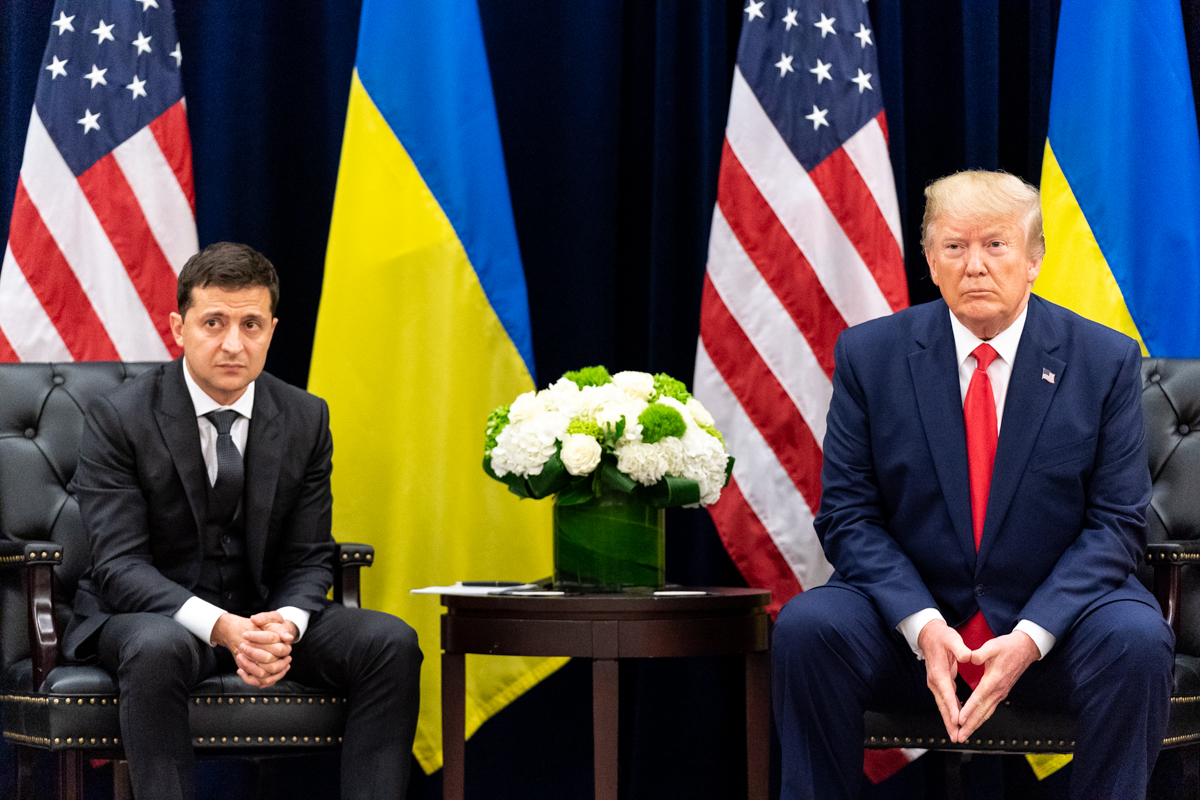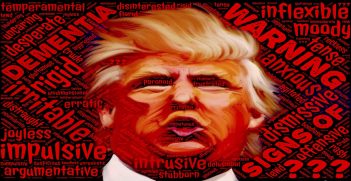Impeaching Trump: “He’s Just Not Worth It”

The decision to impeach Trump is a decision made along party lines, though the advantages of following through with the impeachment are highly questionable.
In impeaching a president for foreign policy malfeasance, America grows into an ever more foreign country. There was no threat of impeachment of George W. Bush for his illegal aggression against Iraq in 2003 whose devastating consequences are still being felt in the region and the world.
Nor was Barack Obama ever under threat of impeachment, despite his campaign of assassination by drones in the Afghanistan-Pakistan badlands in violation of international, humanitarian, human rights and even US constitutional laws. According to the Bureau of Investigative Journalism, there were 2,090 to 3,406 drone kills in the Obama years without benefit of trial, conviction and sentencing. Contradicting the official line, independent analysts claimed that drone strikes “killed seven times as many followers as top terrorists.”
Serious examples of foreign policy misconduct by Donald Trump include the Syria pull-out and the exit from the Iran nuclear deal. He is under threat of impeachment not for these, but for an obscure issue. In a phone conversation with Ukraine’s new President Volodymr Zelensky on 25 July, Trump is alleged to have threatened to withhold military aid unless Ukraine provided dirt against ex-Vice President (VP) Joe Biden, a leading Democratic contender for 2020. From here, it’s useful to disaggregate the substance, process and politics of impeachment.
Substance: Impeachable Offence?
Trump was voted into office by 63 million Americans in full awareness of his character flaws. His vulgarity, coarseness and pathological falsehoods cannot be sufficient grounds to cancel the 2016 election rather than let the people deliver their verdict next year. The Constitution prescribes that the president shall be removed from office for treason, bribery, or other high crimes and misdemeanours. It’s hard to see how Trump’s alleged offence meets this high threshold, especially in comparison to the misdeeds by Bush, Obama and Trump mentioned earlier.
It’s worth reading the notes on Trump’s call directly, without the filter of partisan interpretations. Trump’s main interest was in the role of the digital firm CrowdStrike, who launched the Trump-Russia collusion probe in the middle of the 2016 election that badly derailed the Trump agenda for three years. Finding answers to who, what and why could help prevent future scandals.
No treason is alleged as Trump did not provide aid and comfort to an enemy during war. Nor was there any bribery. At worst, Trump postponed the delivery of some aid which was provided in due course without receiving dirt in return; no money went into either Trump’s or Zelensky’s pocket. In a 14-hour press conference on 10 October, Zelensky insisted he had not been blackmailed and was not aware at the time that US military aid had been delayed; he learnt this a month later.
The longer they keep Ukraine in the spotlight, the messier the Biden-Russia collusion problems get for the Democrats. Hunter Biden’s extensive web of business interests was documented by the Financial Times. Diplomats who raised concerns internally about the apparent conflict of interest at the time were rebuffed. There has been no evidence of illegal or criminal conduct by either of the Bidens. But the pattern of Hunter’s lucrative business dealings in lockstep with countries – Ukraine, China, Romania – for which his father was coordinating US policy, is an extraordinary series of coincidences. By ignoring this elephant in the room, the mainstream US media have only further damaged their already low credibility for fairness, impartiality and curiosity-driven investigative reporting.
The Financial Times reported on the unsavoury reputation of Kiev-based Burisma Holdings Limited, even by prevailing Ukrainian standards of corruption. Allegations against it included tax violations, money laundering and licences obtained while its owner Mykola Zlochevsky was a cabinet minister (2010–12). According to Reuters investigations, with no known expertise in either energy or Ukraine, Burisma paid Hunter US $83,333 monthly for 18 months (an annualised stipend of a cool US $1 million). He did attend the biannual board meetings and provided other services, but never once visited Ukraine. However, none of this was a crime under US law.
But the ethical breaches are blindingly obvious. Every relevant Ukrainian – plus European allies and international institutions – knew of Burisma’s Biden connection and would have been careful to avoid causing a scandal that would weaken Washington’s will and ability to shore up support for the dubious and shaky Petro Poroshenko regime. In this web of corruption, the payment to Hunter was a camouflaged bribe to buy protection in internal Ukrainian politics. Anyone familiar with the workings of business-politician links in essentially corrupt countries will know that all the company needed for protection was the VP’s son on their payroll: nothing more ever needed to be said, although the odd picture of a business executive with the VP himself would be a bonus.
In other words, Ukraine’s dealings with both Trump and Biden must be put under the microscope. If the Democrats fail to do so before they pick their candidate and Biden is their standard bearer, Trump with his uncanny ability to define and destroy opponents will exploit this to the vicious maximum next year. Trump’s hardcore base will not be persuaded to abandon him for talking to a foreign power. This is especially so given the Democrats and the media continue to ignore calls to probe the origins of the Russia collusion story and whether Hillary Clinton and/or the party recruited foreigners and manipulated foreign sources to put candidate Trump on the watchlist of US agencies. However, this particular history of colluding with foreign sources to ensnare a presidential rival did not begin with Trump’s election. The double standards on investigating foreign influence on US elections may prevail on partisan voting but cannot survive public scrutiny.
Process: Entrenching Partisan Perceptions
In 1974, the House Judiciary Committee authorised the impeachment inquiry against Nixon by a near-unanimous 410-4 vote. Such bipartisanship seems unimaginable today. In 1998, the 257-176 majority to proceed with Bill Clinton’s impeachment included 31 Democrats. In the 232-196 House vote on 31 October 2019 to authorise an impeachment inquiry against Trump, all Republicans and two Democrats voted “no.” In other words, after months of investigations, leaks and saturation media coverage, not one Republican vote had shifted. As of now, it seems almost certain that the Democrat-controlled House will vote solidly along party lines to impeach Trump, and that the Republican-controlled Senate will vote to acquit Trump.
Democrat Adam Schiff, chair of the Intelligence Committee conducting the preliminary impeachment inquiry, has proven to be the Bronwyn Bishop of the US Congress. His naked partisanship has probably damaged the Democrats more than the Republicans. Schiff’s claims on the Russia collusion have been discredited and he dissembled about his contacts with the phone call whistleblower to earn four Pinocchios from the Trump-hostile Washington Post fact-checkers. He has also departed from the Richard Nixon and Bill Clinton precedents with secret hearings, refusal to make documents and testimony transcripts publicly available, refusing attendance and cross-examination by the president’s lawyer, and rejecting Republicans’ calls to subpoena witnesses. The tactics have appeased hardline Trump critics but also enabled Republicans to criticise the whole effort as unconstitutional.
Meanwhile, as the guessing game about the original whistleblower’s identity reaches fever pitch, allegations grow about his multiple associations with the Democratic Party and Joe Biden. Consequently, where the Democrats began by demanding his appearance before the House committee, they now seem determined to block his appearance, further fuelling suspicions about his political affiliations and questionable prior contacts with Schiff.
Politics: Damaging the Presidency, Congress and the Republic
By definition, the 41 House seats the Democrats gained in 2018 are swing seats that could revert to the Republicans if voters vent their anger at the partisan impeachment distraction instead of solving the country’s real problems. While the net unfavourability rating for Trump’s job approval is at 11 percent in the RealClear Politics average of polls, Congressional net unfavourability is at 42 percent.
House Speaker Nancy Pelosi in an interview with The Washington Post on 11 March said: “Impeachment is so divisive to the country that unless there’s something so compelling and overwhelming and bipartisan, I don’t think we should go down that path, because it divides the country. And he’s just not worth it.” She was right then and her instinctive judgement is even more relevant just a year out from the next presidential election. Which then begs the question: has her considerable political judgement adjusted to conclude that they need the stigma of Trump having been impeached by the House in order to defeat Trump? Representative Al Green confessed in May: “I’m concerned that if we don’t impeach this president, he will get reelected.” Or will Trump claim a Senate refusal-to-convict as exoneration?
Some Democrats began calling for impeachment as soon as Trump took office, in effect demanding the election be nullified. The sentiment for impeachment gained strength with each tweeted outrage and it became a feasible political project when Democrats regained control of the House in the 2018 midterm elections. Shortly after after she was sworn in, first-term Representative Rashida Tlaib declared “we’re going to impeach the motherf****r” Trump. Now she proudly promotes T-shirts with the exhortation “Impeach the MF.”
The CNN poll on impeachment published on 22 October contained five interesting features: opinion is divided strongly along party lines, with upwards of 80 percent of Democrats and Republicans supporting and opposing respectively (and 88/90 percent in the latest Wall Street Journal/ABC poll); support for impeachment and removal has inched upwards; those who believe Trump used his office improperly in Ukraine has held constant at 49 percent; those saying he did not act improperly increased from 39 percent to 43 percent: more Republicans are firming in their opinion that it’s a political stunt; and Trump’s approval ratings have held steady. Most concerningly for Democrats, in several battleground states, more people oppose than support removing Trump from office through impeachment.
There is also the political opportunity cost. For months the media cycle will be saturated with the impeachment story, crowding out any legislative accomplishments on policy issues on which voters rate Democrats highly. Little wonder that Douglas Schoen, a pollster for Bill Clinton, concludes: “If the 2020 election becomes a polarised battle over impeachment, Democrats may very well lose their gains from 2018, and, for the second election in a row, the White House.”
Most Republican voters seem to believe that the impeachment effort is motivated primarily by two considerations: firstly, the fear that Trump will be re-elected in 2020; and secondly, apprehensions about the investigations into the origins of the Russia probe by Attorney-General William Barr, US Attorney John Durham and Inspector-General of Justice Michael Horowitz. On 24 October, these investigations upshifted from an administrative review to a criminal inquiry with the power to subpoena witnesses and documents, convene a grand jury and file criminal charges.
Ramesh Thakur FAIIA, a former Assistant Secretary-General of the United Nations, is Emeritus Professor of the Crawford School of Public Policy at The Australian National University. He is Director of the Centre for Nuclear Non-Proliferation and Disarmament and co-convener of the Asia-Pacific Leadership Network for Nuclear Non-Proliferation and Disarmament.
This article is published under a Creative Commons Licence and may be republished with attribution.





